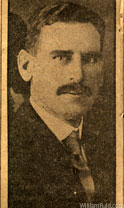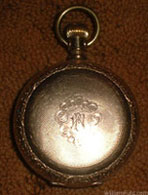
Contact | © 2007 | Robert Murch OUIJA® and MYSTIFYING ORACLE® are both trademarks of Hasbro, Inc. |

Search WilliamFuld.com
|
 |
 |
 |
 |
 |
 |
 |
|||||
|
William Fuld
William Fuld, the third child of Jacob Fuld and Mary Abell, was born in Baltimore, Maryland on July 24, 1870. His father, Jacob Fuld, a Jewish German immigrant, left Büdingen, Hesse Darmstadt, Germany with his parents and siblings and arrived in the United States on September 7th, 1854. His mother Mary Abell was born and raised in York, Pennsylvania. Jacob and Mary were married on September 12, 1863 in Reading, Pennsylvania. Though Jacob was raised in a Jewish home, it appears he eventually left his faith. From all accounts and church records Jacob joined the Franklin Street Presbyterian Church on December 31st, 1885 which his wife Mary had joined some five years earlier. William later joined the same church on March 22, 1894, at the age of 24. Questions still surround whether William and his siblings were raised in a Jewish or Christian household. Likely Jacob married outside his faith and eventually decided to join a Christian church. Jacob did not become a church member until after his father's death. Whichever household William was raised in it was a large one. William Fuld was one of ten children, four boys, and six girls. Listed from oldest to youngest they are Mary, Isaac, William, Lillie, Henrietta, Raymond, Meyer, Sylvia, Violet, and Flora. According to family stories at an early age William, like his brothers and sisters, had a wild imagination and made up many games to amuse himself and others. He attended public school and later the Maryland Institute for the Promotion of the Mechanic Arts / Schools of Art and Design. At the age of 17 he landed his first documented job as a painter/varnisher in 1887. This trade led him to the Kennard Novelty Company which opened their doors in 1890. Though often cited as mereley an employee, company records show he was one of the the original stock holders. It is through his deep friendship with Col. Washington Bowie, William began his association with the Wonderful Talking Board and his meteoric rise to become known as the Father of the Ouija Board. He would later give his daughter Katherine the middle name of Bowie to honor that friendship. William married Annie Carrie Schmidt on August 29th 1891 at St. Luke's Lutheran Church in Baltimore, Maryland. He had seven children, five boys, and two girls. Listed from oldest to youngest they are Carrie Anne, William Andrew, Katherine Bowie, Paul Ambrose, George Edward, Arthur Francis, and Hubert Harris Fuld. One year later William Fuld had filed for his own patent (No. 479,266) which was granted on July 19, 1892. This patent made improvements to the talking board. He was now third only to Col. Washington Bowie and Harry Welles Rusk in all matters concerning the Ouija. Eventually, Bowie and Rusk decided to take a back seat and let others manufacture the Ouija board while continuing to collect a profit. On April 12th 1898 the Ouija Novelty Company assigned its assets and interest including the U. S. Bond Ouija patent 446,054 and U. S. Ouija trademark 18,919 to Bowie and Rusk in the split of 5/6 to Col. Washington Bowie and 1/6 to Harry Welles Rusk. William Fuld and his brother Isaac Fuld founded Isaac Fuld & Brother in November of 1897. On July 18th 1898 the Ouija Novelty Company signed an agreement with William and Isaac, trading as Isaac Fuld & Brother to manufacture and sell Ouija boards for the term of three years. William and Isaac used this agreement to make Ouija boards and other novelties. In 1899 the two expanded their agreement to include payments to Isaac for extra labor. They used the same location of 20 North High Street to run their business and continued to pay royalties to both Harry Welles Rusk and Col. Washington Bowie. On July 18th 1901 William and the Ouija Novelty Company exercised their option not to continue their agreement allowing Isaac Fuld & Brother to manufacture and sell Ouija boards. The Ouija Novelty Company then signed a new agreement exclusively with William Fuld. Whether or not William and Isaac had a falling out that led to this decision, or that act itself caused their bad feelings it would result in a family feud that would last almost a century. It would take their grandchildren Kathy & Stuart Fuld to bury the hatchet in 1997 and reunite the Fuld family. On November 6th 1902 Rusk's relationship with the Ouija board came to an end when he sold his 1/6 remaining interest to Bowie for $1.00. Bowie in turn gave William the exclusive right to manufacture Ouija boards. William's first talking board trademark, Oracle (No. 37,806), was granted on February 18, 1902. Almost completely forgotten were all the other toys and games William invented or manufactured. Few know he held the first trademark on the Return Pool table or that he put his label on sandboxes, pails, dart boards, combination 57 tables, doll furniture or countless numbers of other novelties and parlor games. In all William Fuld held over 33 patents, trademarks, and copyrights combined. In 1904, like many associated with the Ouija board, he became a member of the Masons. He was also a member of the Heptasophs, Old Town Merchants and Manufacturers, Merchants and Manufacturers Association, 9th Ward Democratic Club, and the Toy Manufacturers Association of America New York Office. William Fuld manufactured various talking boards and other amusements moving frequently into larger factories until in 1918 when he built a three story, 36,000 feet factory at Harford Avenue, Lamont Avenue, and Federal Street. The factory cost one-hundred and twenty-five thousand dollars. On April 24th 1919 William became the sole owner of the Ouija board when Col. Washington Bowie assigned all remaining rights and interest in the U. S. Ouija trademark 18,919 to him. William saw the Ouija board through numerous company names; The Kennard Novelty Company, The Ouija Novelty Company, Isaac Fuld & Bother, William Fuld, and William Fuld & Sons. William also saw the Ouija board tear him and his brother Isaac apart, separating their families in a feud lasting almost a century beginning in 1901 and ending with their grandchildren Kathy and Stuart in 1997. A learned man, it is reported that William could speak seven languages. He served as a Custom's Inspector for the Port of Baltimore from 1896-1924. In 1924 he extended his public service by running for and winning a seat as a Democrat with the Maryland House of Delegates for the Third District. William Fuld traveled extensively but kept his family close by carrying pictures of them wherever he went. He was a charitable man who supported many local causes.
On February 24th 1927 while overseeing the replacement of a flagpole, William Fuld was tragically killed by complications falling from the roof of his three story Harford, Lamont, and Federal Street factory. The iron support he was leaning on gave way, and he tumbled backwards off the roof, grasping and catching one of the factory windows and then falling to the ground. He suffered a “concussion of the brain, five fractured ribs, a broken arm, a fractured leg, and numerous cuts and bruises.” An employee who witnessed the fall picked him up and rushed him to the hospital where he later died from one of his broken ribs piercing his heart. Laying on his deathbed he made his children promise they would never sell the Ouija board. The business was taken over by his children headed by William A. Fuld. Due to the age and recurrent health problems of William Andrew the entire business and the Ouija board were sold to Parker Brothers on February 24th 1966. It was the thirty-ninth anniversary of William Fuld's death. |
|||||

